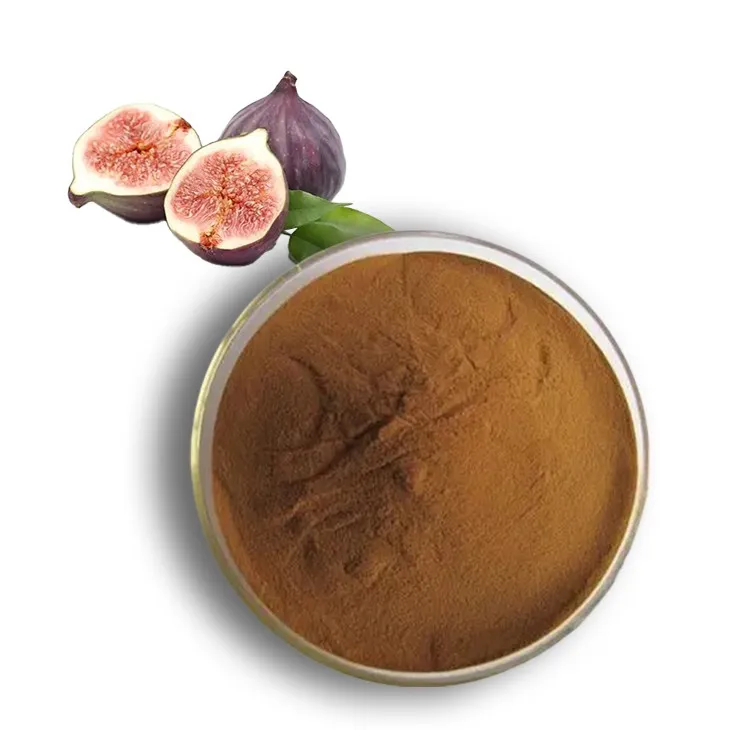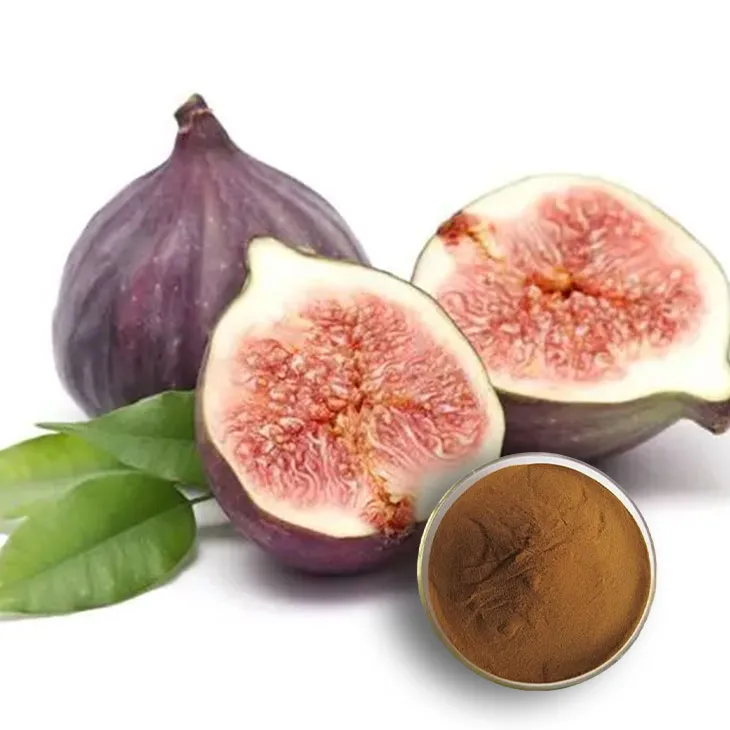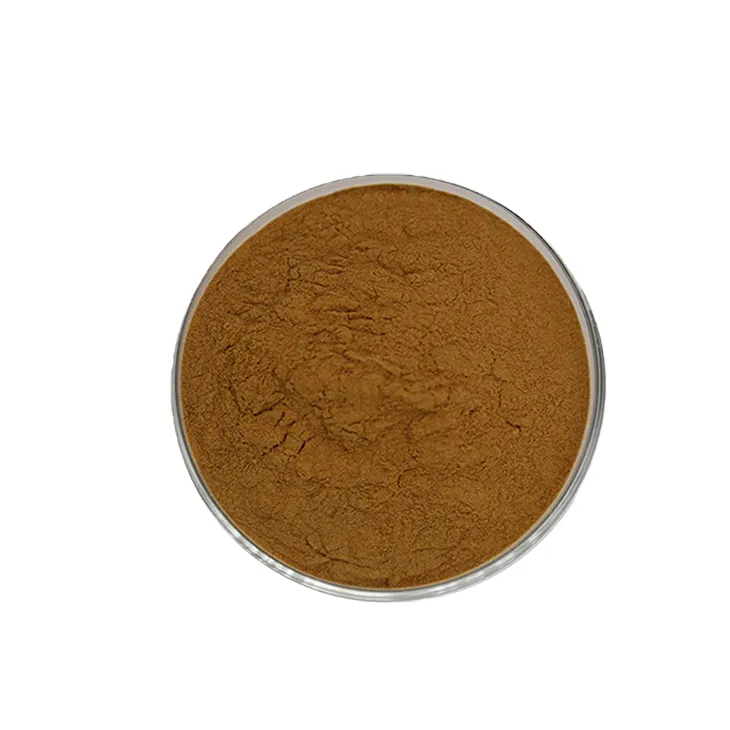- 0086-571-85302990
- sales@greenskybio.com
14 Great Health - care Effects of Fig Extract.
2024-11-12

1. Introduction
Fig Extract has emerged as a natural product with remarkable health - enhancing properties. In recent years, scientific research has delved deeper into the composition and potential benefits of Fig Extract, uncovering a plethora of positive effects on human health. This article will explore 14 significant health - care effects of Fig Extract, highlighting why it is becoming an increasingly important component in the pursuit of a healthy lifestyle.

2. Nutrient - Rich Profile
Fig extract is packed with essential nutrients. Vitamins such as vitamin A, vitamin C, and several B - vitamins are present in fig extract. Vitamin A is crucial for good vision, healthy skin, and proper immune function. Vitamin C is a well - known antioxidant that helps in protecting cells from damage, enhancing the immune system, and promoting collagen synthesis for healthy skin and connective tissues. The B - vitamins play a vital role in energy metabolism, nerve function, and the production of red blood cells.
Minerals like potassium, calcium, magnesium, and iron are also found in fig extract. Potassium is essential for maintaining proper heart function and regulating blood pressure. Calcium is required for strong bones and teeth, as well as for normal muscle function. Magnesium is involved in over 300 enzymatic reactions in the body, including those related to energy production and muscle relaxation. Iron is necessary for the formation of hemoglobin, which transports oxygen in the blood.

3. Immune System Enhancement
The combination of vitamins, minerals, and other bioactive compounds in fig extract makes it a powerful booster for the immune system. Antioxidants present in fig extract, such as polyphenols, help in neutralizing free radicals that can damage immune cells. Free radicals are unstable molecules that can cause oxidative stress in the body, leading to a weakened immune system.
Moreover, the vitamins in fig extract, especially vitamin C, play a direct role in immune function. Vitamin C stimulates the production and function of white blood cells, which are the body's first line of defense against pathogens. By regularly consuming fig extract, the body can better fend off infections, whether they are caused by bacteria, viruses, or other microorganisms.

4. Potential Anti - Cancer Properties
Several studies have suggested that fig extract may possess potential anti - cancer properties. The bioactive compounds in fig extract, such as flavonoids and phenolic acids, have been shown to exhibit anti - proliferative effects on cancer cells in vitro. These compounds can interfere with the cell cycle of cancer cells, preventing them from dividing uncontrollably.
Some research has also indicated that fig extract may induce apoptosis (programmed cell death) in cancer cells. Apoptosis is a natural process by which the body gets rid of damaged or abnormal cells. By promoting apoptosis in cancer cells, fig extract may help in reducing the growth and spread of tumors. However, it is important to note that while these findings are promising, more in - vivo and clinical studies are needed to fully understand the anti - cancer potential of fig extract.
5. Improvement of Gut Microbiota
The gut microbiota plays a crucial role in overall health, and fig extract has been shown to have a positive impact on it. Fig extract contains dietary fiber, which serves as a prebiotic. Prebiotics are substances that are not digested by the human body but are fermented by the gut bacteria. This fermentation process promotes the growth of beneficial bacteria in the gut, such as Bifidobacteria and Lactobacilli.
Beneficial gut bacteria are involved in various aspects of health, including digestion, nutrient absorption, and immune function. They can also produce short - chain fatty acids, which have anti - inflammatory properties and can help in maintaining the integrity of the gut barrier. By improving the gut microbiota, fig extract can contribute to better digestive health, reduced inflammation in the gut, and potentially even improved mental health, as there is a growing link between gut health and brain function.
6. Positive Impact on Fat Metabolism
Fig extract can have a positive influence on fat metabolism. Some of the bioactive compounds in fig extract, such as certain polyphenols, may enhance the activity of enzymes involved in fat breakdown. These enzymes, such as lipase, help in converting stored fat into fatty acids and glycerol, which can then be used for energy production.
Furthermore, fig extract may also play a role in regulating lipid levels in the blood. It can potentially reduce the levels of LDL (low - density lipoprotein) cholesterol, also known as "bad" cholesterol, while maintaining or even increasing the levels of HDL (high - density lipoprotein) cholesterol, which is considered "good" cholesterol. By improving fat metabolism and lipid profiles, fig extract may contribute to a reduced risk of obesity, cardiovascular diseases, and other metabolic disorders.
7. Blood Pressure Regulation
The potassium content in fig extract is beneficial for blood pressure regulation. Potassium helps in counteracting the effects of sodium in the body. High sodium intake is associated with increased blood pressure, and by increasing potassium intake through fig extract consumption, the body can better maintain a healthy balance of electrolytes.
Some bioactive compounds in fig extract may also have vasodilatory effects. Vasodilation is the widening of blood vessels, which leads to a decrease in blood pressure. By promoting vasodilation, fig extract can help in reducing the workload on the heart and improving overall cardiovascular health.
8. Anti - Inflammatory Effects
Fig extract contains anti - inflammatory compounds such as polyphenols and flavonoids. Inflammation is a natural response of the body to injury or infection, but chronic inflammation can lead to various diseases, including arthritis, heart disease, and diabetes.
The anti - inflammatory properties of fig extract can help in reducing inflammation at the cellular level. These compounds can inhibit the production of inflammatory mediators, such as cytokines and prostaglandins. By reducing chronic inflammation, fig extract may contribute to the prevention and management of inflammatory diseases and improve overall quality of life.
9. Skin Health Promotion
The vitamins and antioxidants in fig extract are beneficial for skin health. Vitamin C, as mentioned earlier, is important for collagen synthesis. Collagen is a protein that gives skin its elasticity and firmness. By promoting collagen production, fig extract can help in reducing the appearance of wrinkles and fine lines, keeping the skin looking youthful.
9.1. Moisture Retention
Fig extract also has the ability to help the skin retain moisture. This is due to its content of certain compounds that can form a protective barrier on the skin's surface. This barrier helps in preventing water loss from the skin, keeping it hydrated and supple.
9.2. Protection Against UV Damage
Some of the antioxidants in fig extract may also offer protection against UV - induced damage. UV radiation from the sun can cause damage to skin cells, leading to premature aging and an increased risk of skin cancer. The antioxidants in fig extract can scavenge free radicals generated by UV exposure, reducing the oxidative stress on the skin and potentially protecting against UV - related skin damage.
10. Bone Health Support
The calcium and magnesium content in fig extract is beneficial for bone health. Calcium is the main building block of bones, and magnesium is required for the proper absorption and utilization of calcium in the body.
Some of the bioactive compounds in fig extract may also play a role in promoting bone formation and inhibiting bone resorption. Bone resorption is the process by which old bone tissue is broken down, and if it occurs at a faster rate than bone formation, it can lead to osteoporosis. By supporting both bone formation and inhibiting excessive bone resorption, fig extract can contribute to maintaining strong and healthy bones.
11. Digestive Aid
As mentioned earlier, the dietary fiber in fig extract is a great digestive aid. Fiber adds bulk to the stool, which helps in preventing constipation. It also promotes regular bowel movements, ensuring the proper elimination of waste from the body.
Fig extract can also stimulate the secretion of digestive juices, such as gastric acid and bile. These digestive juices are necessary for the breakdown and absorption of nutrients in the digestive tract. By improving digestion, fig extract can help in preventing digestive disorders such as indigestion, bloating, and acid reflux.
12. Anti - Aging Effects
The antioxidants in fig extract play a significant role in anti - aging. Oxidative stress is one of the main factors contributing to the aging process. Free radicals generated during normal metabolic processes and due to environmental factors can damage cells, proteins, and DNA, leading to the signs of aging, such as wrinkles, age spots, and a decline in organ function.
By scavenging free radicals, the antioxidants in fig extract can help in reducing oxidative stress and protecting cells from damage. This can slow down the aging process at the cellular level, potentially leading to a longer and healthier lifespan.
13. Diabetes Management
Some research has suggested that fig extract may have a role in diabetes management. Fig extract may help in regulating blood sugar levels. The fiber content in fig extract can slow down the absorption of carbohydrates, preventing rapid spikes in blood glucose levels after a meal.
Also, some bioactive compounds in fig extract may improve insulin sensitivity. Insulin is a hormone that regulates blood sugar levels, and when cells become resistant to insulin, it can lead to type 2 diabetes. By improving insulin sensitivity, fig extract may help in better blood sugar control in diabetic patients.
14. Stress Reduction
Some of the bioactive compounds in fig extract may have a calming effect on the nervous system. Stress is a common problem in modern society, and chronic stress can have negative impacts on both physical and mental health.
By reducing stress, fig extract may help in improving sleep quality, reducing anxiety, and enhancing overall well - being. However, more research is needed to fully understand the mechanisms by which fig extract may reduce stress.
15. Conclusion
Fig extract is truly a natural wonder with a wide range of health - care effects. From enhancing the immune system and potentially fighting cancer to improving gut health, metabolism, and skin health, it offers numerous benefits. Incorporating fig extract into a healthy lifestyle can be a great way to promote overall health and well - being. However, it is important to note that while fig extract shows great promise, more research is still needed to fully understand its mechanisms of action and to optimize its use for various health conditions.
FAQ:
What are the main nutrients in fig extract?
Fig extract contains various nutrients such as vitamins (like vitamin A, C, E), minerals (such as potassium, magnesium), and dietary fiber. These nutrients play important roles in maintaining good health. For example, vitamins are essential for many physiological functions, minerals are involved in processes like muscle function and nerve conduction, and dietary fiber is beneficial for gut health.
How does fig extract enhance immunity?
The nutrients in fig extract contribute to enhancing immunity. Vitamins like vitamin C are known for their immune - boosting properties. They help in the production of white blood cells which are crucial for fighting off infections. Also, the antioxidants present in fig extract can protect the body's cells from damage, which in turn supports the proper functioning of the immune system.
What evidence is there for the anti - cancer properties of fig extract?
Some studies have shown that certain compounds in fig extract may have potential anti - cancer properties. These compounds can interfere with the growth and spread of cancer cells. For example, they may induce apoptosis (programmed cell death) in cancer cells or inhibit angiogenesis (the formation of new blood vessels that tumors need to grow). However, more research is still needed to fully understand and confirm these effects.
How does fig extract improve gut microbiota?
The dietary fiber in fig extract is a key factor in improving gut microbiota. It acts as a prebiotic, which means it provides food for beneficial bacteria in the gut. These bacteria then multiply and help in maintaining a healthy balance in the gut. A balanced gut microbiota is associated with better digestion, absorption of nutrients, and a stronger immune system.
Can fig extract help with weight loss?
Fig extract may be helpful for weight loss due to its impact on metabolic functions, especially fat metabolism. By promoting the breakdown of fats, it can potentially contribute to a reduction in body fat. Also, its high fiber content can make you feel fuller for longer, reducing overall calorie intake.
Related literature
- The Health Benefits of Fig Extract: A Comprehensive Review"
- "Fig Extract and Its Impact on Immune Function: Experimental Studies"
- "Anticancer Potential of Fig - derived Compounds: Current Research"
- ▶ Hesperidin
- ▶ Citrus Bioflavonoids
- ▶ Plant Extract
- ▶ lycopene
- ▶ Diosmin
- ▶ Grape seed extract
- ▶ Sea buckthorn Juice Powder
- ▶ Fruit Juice Powder
- ▶ Hops Extract
- ▶ Artichoke Extract
- ▶ Mushroom extract
- ▶ Astaxanthin
- ▶ Green Tea Extract
- ▶ Curcumin
- ▶ Horse Chestnut Extract
- ▶ Other Product
- ▶ Boswellia Serrata Extract
- ▶ Resveratrol
- ▶ Marigold Extract
- ▶ Grape Leaf Extract
- ▶ New Product
- ▶ Aminolevulinic acid
- ▶ Cranberry Extract
- ▶ Red Yeast Rice
- ▶ Red Wine Extract
-
Sea buckthorn oil
2024-11-12
-
Carrageenan Extract Powder
2024-11-12
-
Kelp Extract Powder
2024-11-12
-
Rose Hip Extract
2024-11-12
-
Feverfew Extract
2024-11-12
-
Epimedium extract powder
2024-11-12
-
Nettle leaf extract
2024-11-12
-
Tongkat Ali Extract
2024-11-12
-
Andrographis Paniculata Extract Powder
2024-11-12
-
Moringa powder
2024-11-12





















